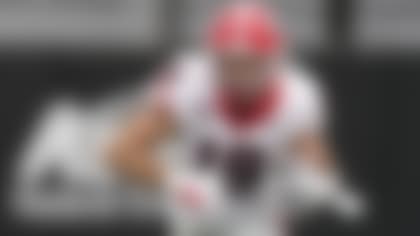The draft is behind us, but I hope college football players followed the process from start to finish because there were some valuable lessons to be gleaned.
Here's a look at six of those lessons the prospects of the future should carry with them as they prepare for the 2015 season.
Preseason hype means nothing
You can still be one of the top guys come draft day, even if you're not getting any buzz in the preseason.
We didn't hear much talk about Auburn OT Greg Robinson during the preseason as he readied for his redshirt sophomore year, but he was dominant all season and carried that through to be the No. 2 overall pick in the draft. It's what you do out on the field -- not preseason chatter -- that gets you noticed by NFL teams.
Play to your level
The top players in college football shouldn't start believing they can go about things the way Jadeveon Clowney did last season and think they can still be the No. 1 overall pick in the draft. Failing to play up to his potential last season didn't negatively impact Clowney's draft stock, but he's the anomaly. If you don't play to your level, it usually hurts you unless you're 6-foot-6, 266 pounds and run a 4.53-second 40-yard dash like Clowney did at the combine. If you can do that, then you're forgiven. Clowney is the only guy in that category, though.
Don't change what's worked for you
Teddy Bridgewater's decision not to wear gloves during his pro-day workout became a huge story after he surprised observers with his struggles at the event. He had worn gloves throughout his successful career at Louisville, and believed going without the gloves affected his accuracy during the workout. His stock tumbled after the subpar showing. Sure, Bridgewater still went in the first round (32nd overall to the Vikings), but he went through one of the bumpiest offseasons a top-ranked guy can endure, and he might have been able to avoid one of the biggest issues had he just remained consistent and kept the gloves on.
There are similar stories for other players, who suddenly changed what had worked for them. Cal tight end Richard Rodgers was listed at 245 pounds last season, but weighed in at 257 pounds at the NFL Scouting Combine. I think it was a mistake for him to add weight. He went late in the third round to the Packers, but probably would have gone earlier if he had stayed lighter and played to his strength, which is speed and quickness.
All hope is not lost post-injury ... if your tape is strong enough
Both Clemson guard Brandon Thomas and Oklahoma cornerback Aaron Colvin suffered ACL tears in the lead-up to the draft (Thomas during a private workout for the Saints; Colvin during a Reese's Senior Bowl practice).
There's no doubt the injury hurt their stock -- both are not expected to play in 2014 -- but they showed it's what you do along the way that keeps you held in high esteem, as both players were drafted (Thomas by the 49ers in Round 3; Colvin by the Jaguars in Round 4). Getting hurt doesn't preclude you from getting your shot if your game tape does plenty of talking for you.
Do your homework, underclassmen
Use this USC trio as a cautionary tale -- George Uko, Dion Bailey and Xavier Grimble were all underclassmen that came out early and had question marks -- none of them were drafted. If you're an underclassman, you better really know where your ranking is before you decide to make that jump.
It doesn't matter where you're from
Small-school prospects should remember the name Terrence Fede. Fede, the Pioneer Football League Defensive Player of the Year last season, became the first Marist College (Poughkeepsie, New York) football player to be drafted when the Dolphins took him in the seventh round.
If you're good and have potential, the NFL will find you.
Follow Charles Davis on Twitter @CFD22.












